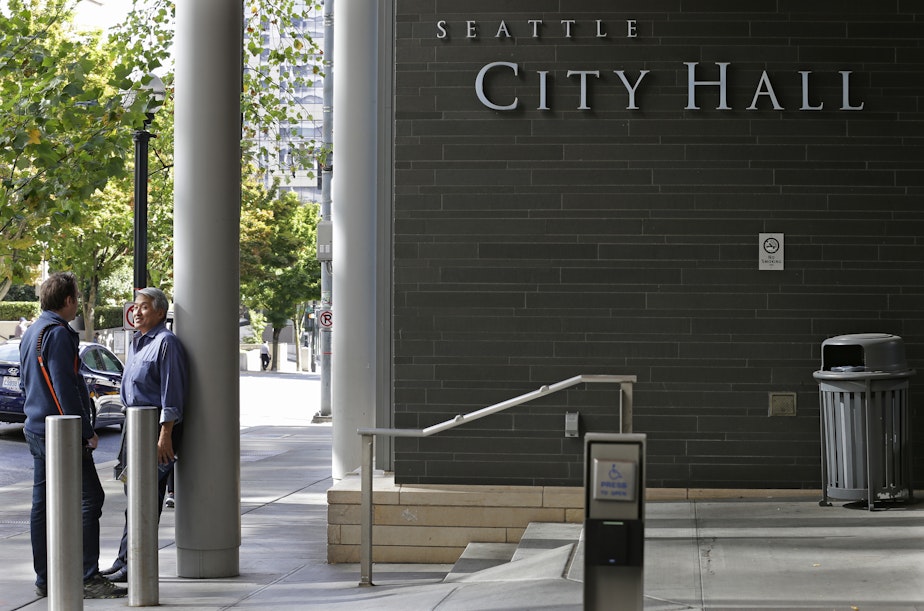Will City Hall give downtown Seattle a tax break?

Downtown Seattle stakeholders are urging city leaders to provide some tax relief to help spur the neighborhood's recovery from pandemic slowdowns. But some at City Hall may not agree on the solutions to downtown's economic woes.
"In conversation with the mayor's office, I think we all are very interested in revitalizing the downtown core," Councilmember Teresa Mosqueda told KUOW. "It's been a focus of this administration and the council has been very supportive."
The approach to helping downtown is where some at City Hall may differ from business advocates. Mosqueda is the council's budget chair. While she is supportive of revitalizing downtown, she does not support the request for a tax holiday. Instead, she argues that the revenue from business taxes gets directed at public services, which in turn, supports the private market and helps local businesses weather economic downturns.
"I think it's shortsighted and it's contradictory to what good economic policy tells us, that data supports, and the economic proof has shown us," Mosqueda said. "When we have revenue that supports keeping people employed, when we prevent layoffs in the public sector — which both the B&O tax and JumpStart have done — it actually buoys our local economy and it supports the private market as well."
In a statement this week, Downtown Seattle Association CEO Jon Scholes differed from perspectives like Mosqueda's, arguing that, "The ability to fund basic services and priorities across the city will only become more challenging if downtown’s revitalization is impaired."
Sponsored
Mayor Bruce Harrell has not yet provided specific details on his plans for downtown recovery. In a statement, a spokesperson for the mayor's office noted that Harrell's post-pandemic economic plan is expected next month. That plan should speak to many of the concerns being raised by downtown stakeholders.
"Since day one of Mayor Harrell’s administration, we have been focused on supporting local businesses and job creation. Fluctuations of the post-pandemic economy are impacting employers across Seattle and the country, as well as the City’s ability to maintain and expand critical services. A focus of these programs are included in the mayor’s Downtown Activation Plan, which will be released in April, the result of extensive partnership with employers, residents, and other stakeholders. As we continue our work to revitalize downtown, hire more police officers, and deliver effective public safety, we will need to calibrate existing revenue sources with the cost of funding those efforts – and the overall price of other essential City services residents rely on, needed homelessness and affordable housing investments, and projected budget deficits in the coming years. We need transparency and dialogue to set priorities for both revenue and spending to weather these changes and best support all Seattle communities."
Mayor Harrell delivered a similar message to the Downtown Seattle Association last week, when Scholes laid out four requests to heal downtown, including:
- Make streets welcoming to all.
- Bring employees back into offices.
- Make it easy to open a business in downtown.
- And "do no harm," which essentially meant "don't raise taxes."
Seattle business taxes
Sponsored
Seattle's JumpStart tax charges employers for every employee earning more than $150,000 annually. It went into effect in 2021 and took in $230 million its first year, exceeding the city's own expectations. Mosqueda says that such funding went into business grant funding, and diversifying the downtown economy.
"The revenues we have seen come to the city, whether it's B&O taxes or JumpStart, those funds are being turned around and directly being infused into creating economic vitality in the downtown core and across the city," Mosqueda said. "We have seen businesses shutter during these times, we have seen people lose their livelihoods, and their lives, during Covid. But what the revenue returns have been able to do is infuse funding into small business support, direct worker support, and especially helping our most marginalized businesses."
Some in downtown Seattle are already working on other aspects the Downtown Seattle Association, or DSA, has requested. Amazon is bringing employees back into the office three days a week. However, last week, Amazon also announced it is laying off 9,000 employees. This is on top of the previously announced 18,000 layoffs at the company.
“In light of continuing layoff notices, the city should immediately suspend the B&O tax and the JumpStart payroll tax as a means to attract new jobs and small businesses to downtown," Scholes said in the wake of the layoff announcement this week. "Removing barriers and costs is how we will create more jobs, economic opportunity and strengthen Seattle’s tax base. DSA, the Seattle Metro Chamber and NAIOP recommended suspending the payroll tax among other actions in a recent letter to city leaders. Put simply, the city should 'do no harm' as we work to revitalize downtown. Downtown generates nearly half of the city’s tax revenues and attracting new investment in downtown will be critical to stabilizing the city’s tax base. The ability to fund basic services and priorities across the city will only become more challenging if downtown’s revitalization is impaired. Cities across the country are putting incentives and tax breaks in place to revive their downtowns. Seattle must do the same.”
This story previously including information from Councilmember Teresa Mosqueda's quotes, stating that Seattle's JumpStart tax contributed to replacing broken store windows in downtown. The Storefront Repair Fund was supported by funding from Coronavirus Local Fiscal Recovery Funds (under the American Rescue Plan Act).


